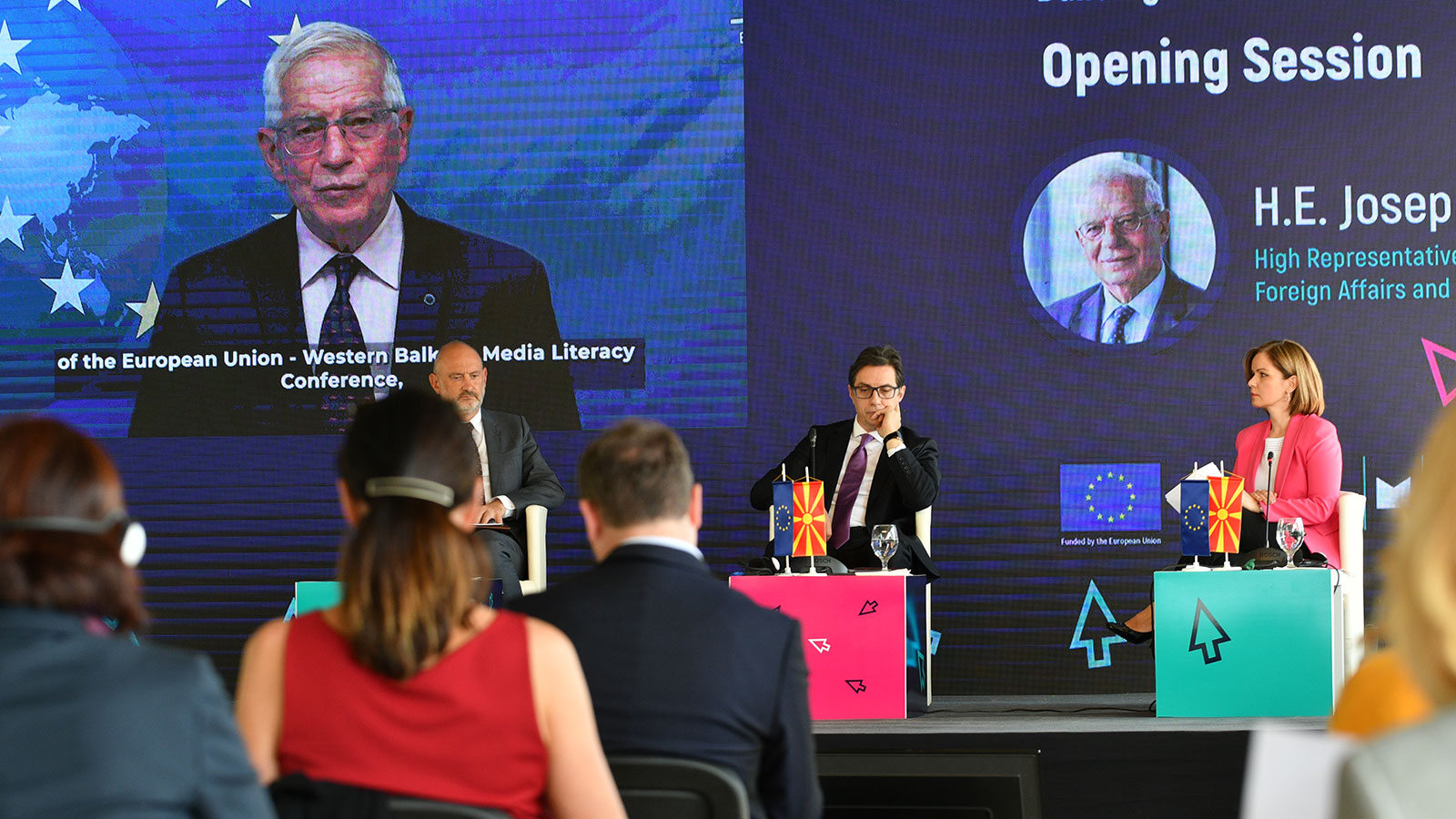The EU-Western Balkans Media Literacy Conference “Building Resilience to Disinformation” was organized on 27 September 2021 at the Museum for Contemporary Art Skopje, North Macedonia and online. Leading stakeholders from the European Union and the Western Balkans discussed about the ever-growing spread of the disinformation phenomenon, new challenges for professional media and the importance of media literacy for citizens in the new media environment. The conference had a hybrid format including both physical participation of panelists from North Macedonia and online presentations by international speakers.
This second edition of the conference was organized by the Macedonian Institute for Media with support by the Delegation of the European Union to the Republic of North Macedonia.
The main conclusions and recommendations from the conference are the following:
- Fight against disinformation needs to be comprehensive and inclusive as much as possible. All relevant stakeholders need to work together for strengthening resilience and capacity to combat disinformation on personal, institutional and media level. This involves inclusion of media literacy in the formal education, better conditions for professional and independent work of media, effective implementation of the regulation, support for self-regulatory mechanisms and fact-checking platforms.
- Governments and public authorities need to demonstrate political will and practice active transparency as an approach in combating disinformation. This requires enabling as much as possible open data by the institutions on central and local level, supporting inclusion of media literacy, address rapidly requests from media and actors who need timely and accurate information, as well as support and cooperation with fact-checkers. Governments and public institutions need to ensure a legal framework in support of professional media, including ahead of elections.
- Disinformation is a threat to democracy, as well as to public safety and health as it was seen during the COVID-19 pandemic. As such, public awareness about this phenomenon must be risen and strengthen.
- In the light of the last changes in the EU Directive for Audiovisual Media Services, countries have bigger obligations concerning media literacy across all sectors of society, including all ages and all media, as well as in regards to reporting on the measures undertaken.
- The fight against disinformation needs coordinated efforts that will engage the self-regulatory mechanisms which need to be supported by journalists, political and state actors. The support from the business community is also essential, for instance when it comes not to finance advertisements on non-professional media.
- Trust in professional media as sources of credible information needs to be promoted and increased. This is essential especially in polarized societies, since low consumption of professional news could turn audiences to seek for information exclusively on social media. This has the potential to increase further polarization and make the audience more exposed to disinformation.
- Professional media outlets need to be supported to fight disinformation, propaganda and hate speech. Working in saturated environment where too many media fight for limited advertising revenues, media outlets face problems related to their development and to sustainability of professional journalism. Professional journalism needs to be supported through different mechanisms employed by the state, such as establishment of funds for producing content of public interest, tax releases, etc.
- Social media define the narrative, which can have positive and negative aspects. The positive aspect is that through social media, media outlets can reach to large and also to young audience. Therefore, journalists and media must follow the changes and adjust fast to the new technological developments in order to be more competitive in the digital environment and reach all segments of the public.
- The social networks for certain period were a “golden mine” for investigative journalism. But the social networks impose rapid changes in the process of distribution of the news and control over the news content that is spread in the online sphere. This is due to the audience who it is not only receiver, but also co-producer who reshapes and gives different interpretations to the content that sometimes could be different or contradictory with the original reports.
- Journalists working in online media must abide to the professional principles as journalists in traditional media. Verifying sources of information is key. Professional journalists must check data and sources, need to go to the field, talk to people and witnesses events for themselves, despite working under pressure imposed by the social networks and online media who fight for clicks and race to publish the news first, which often limits the possibilities for verification of information.
- In order to help the public to fully understand and navigate online media it is important to strengthen media, information and digital literacy skills of the citizens, but also science literacy.
- Young people may not have enough information about what professional journalism means, and thus lack skills to recognize unprofessional items that come from various sources. The public, especially young people need to be introduced with the notion and principles of professional journalism with the aim to gain effective resilience to disinformation.
- The political centers of power and political figures should refrain from giving any support to unprofessional media. Number of researches across the region has shown that disinformation is spread in systematic and coordinated manner and in many cases disinformation can be traced to political parties or political figures.
- The relevant institutions, civil society and media organizations, human rights activists must raise awareness, advocate and use all institutional measures in order to protect journalists and activists that are targets of smear campaigns on the social networks.
- Active engagement and rapid reaction from the institutions is essential in combating production and spread of disinformation, propaganda and hate speech on social networks and online.
Citizens’ organizations, especially human rights organizations, must become more digital in their operation, advocacy activities and transfer of knowledge, since many of the human rights breaches are happening in the digital environment.
